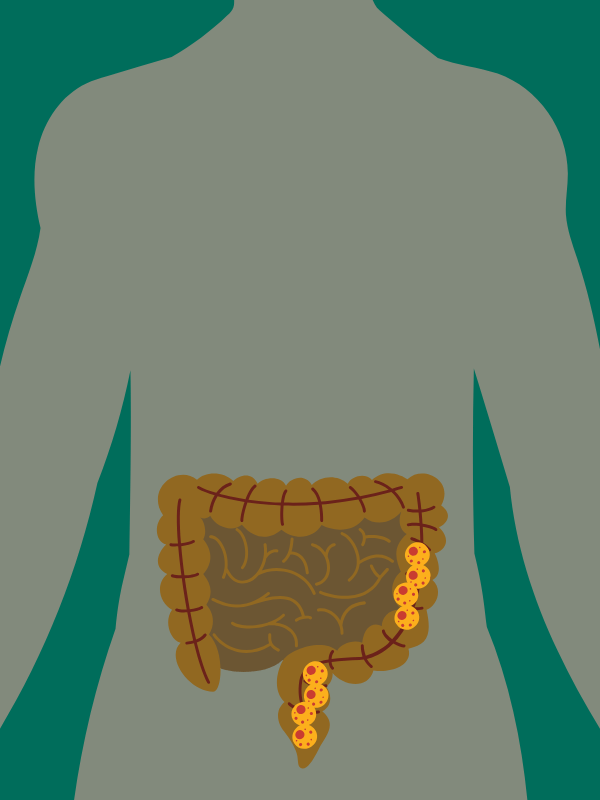
"What if the thing standing between you and bowel cancer was the salad you didn’t eat?"
Now, that’s not your usual dinner conversation, but maybe it should be.
April marks Bowel Cancer Awareness Month, a time not just to wear a ribbon, but to ask better questions about our food, our habits, and the microscopic warriors called phytochemicals. Phytochemicals also known as plant chemicals are naturally occurring compounds, found abundantly in plants that have shown promise in the prevention and management of colorectal cancer.
According to the World Health Organization, bowel (or colorectal) cancer is the third most common cancer worldwide and the second leading cause of cancer deaths globally1.
What Is Bowel Cancer?
Bowel cancer, or colorectal cancer is a silent intruder. It often begins its journey unnoticed. Early bowel cancer screening makes it easy to treat. It is found in the colon or rectum2.
Bowel Cancer Symptoms:
Early signs may include3:
- Altered Bowel Habits: Experiencing diarrhea, constipation, or a sensation of incomplete evacuation.
- Rectal Bleeding: Noticing blood in the stool.
- Abdominal Discomfort: Tummy pain, bloating.
- Unexplained Weight Loss: Shedding pounds without a change in diet or activity.
The Genesis of Bowel Cancer: Culprits and Contributors
The bowel cancer causes are multifaceted4:
- Dietary Choices: High consumption of red and processed meats.
- Genetic Predisposition: A family history can elevate susceptibility.
- Lifestyle and Environmental Factors: Sedentary habits, obesity, drinking more alcohol and smoking contribute to risk.
Understanding these colon cancer causes is essential for crafting effective prevention strategies.
Phytochemicals: Nature's Chemopreventive Agents
Plants don’t just grow. They defend themselves against UV rays, insects, disease etc by producing phytochemicals also known as plant chemicals. Ironically, the phytochemicals defend us too and they show chemopreventive and anti-cancer properties5.
|
Phytochemical |
Plant Sources |
Potential Support in |
|
Curcumin |
Turmeric |
Reducing colon tumors, inhibiting colonic precancerous lesion. |
|
Resveratrol |
Grapes, blueberries, raspberries, mulberries, and peanuts. |
Inducing apoptosis in cancer cells. |
|
Quercetin |
Apples, nuts, cauliflower, cabbage, onions, grapes, berries, broccoli, citrus fruits, cherries, green tea, and Moringa. |
Reducing number and size of colon tumors. |
In addition to the above, there are literature searches covering 172 experimental studies and 71 clinical cases across 190 different plants. And what do they show us? Grape, soybean, green tea, garlic, olive, and pomegranate aren’t just foods—they’re some of the most powerful natural agents we’ve got in the fight against colon cancer6.
Harnessing Phytochemicals: Practical Steps
To leverage these natural defenders:
- Diversify Your Diet: Incorporate a rainbow of fruits and vegetables to ensure a spectrum of phytochemicals.
- Favor Whole Foods: Opt for minimally processed foods to maximize phytochemical intake.
- Mindful Cooking: Some phytochemicals are sensitive to heat; steaming vegetables can preserve their integrity.
In other words, your salad bowl or plate may be your first line of defense—not just your doctor's office.
The Road Ahead: Integrative Approaches
While phytochemicals present a promising avenue, they are part of a broader integrative strategy that includes regular screenings, physical activity, and informed lifestyle choices. Embracing this holistic approach can fortify our defences against bowel cancer.
Disclaimer:
The information provided is solely for educational purposes. This content does not replace medical advice, diagnosis, or treatment. Consult a qualified healthcare professional for any medical queries or concerns. BeatNaturally does not promote or suggest specific tests, doctors, procedures, viewpoints, or details mentioned in the content.
Sources:
- Colorectal cancer
- https://www.nhs.uk/conditions/bowel-cancer/what-is-bowel-cancer/
- https://www.nhs.uk/conditions/bowel-cancer/symptoms/
- https://www.nhs.uk/conditions/bowel-cancer/causes/
- https://pmc.ncbi.nlm.nih.gov/articles/PMC9913554/
- https://pubmed.ncbi.nlm.nih.gov/32377288/
